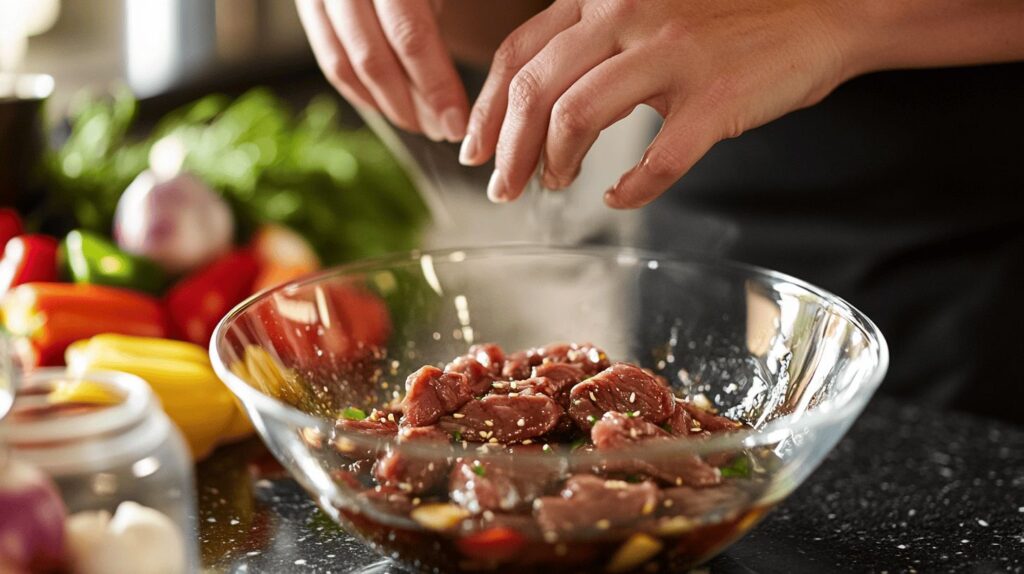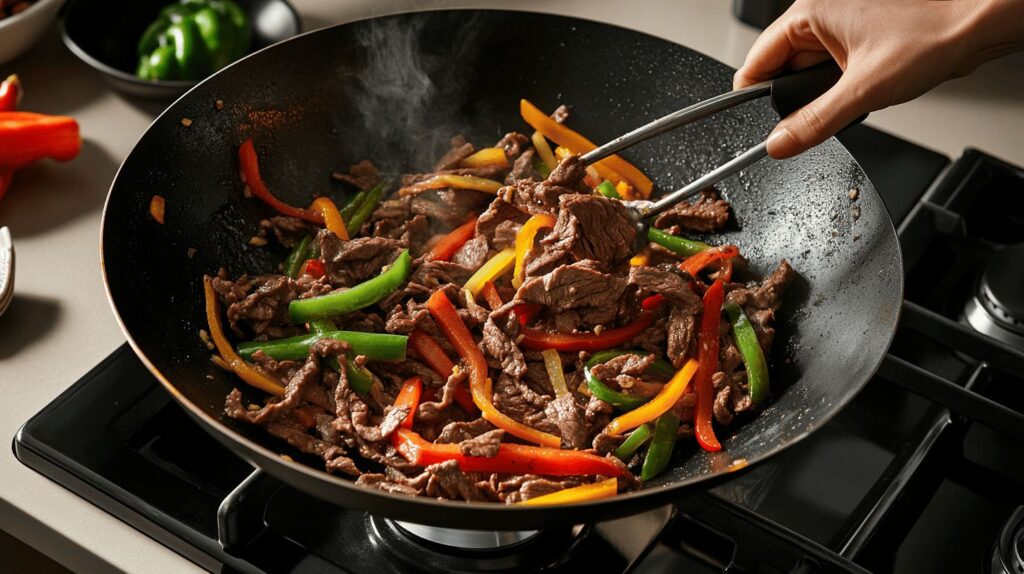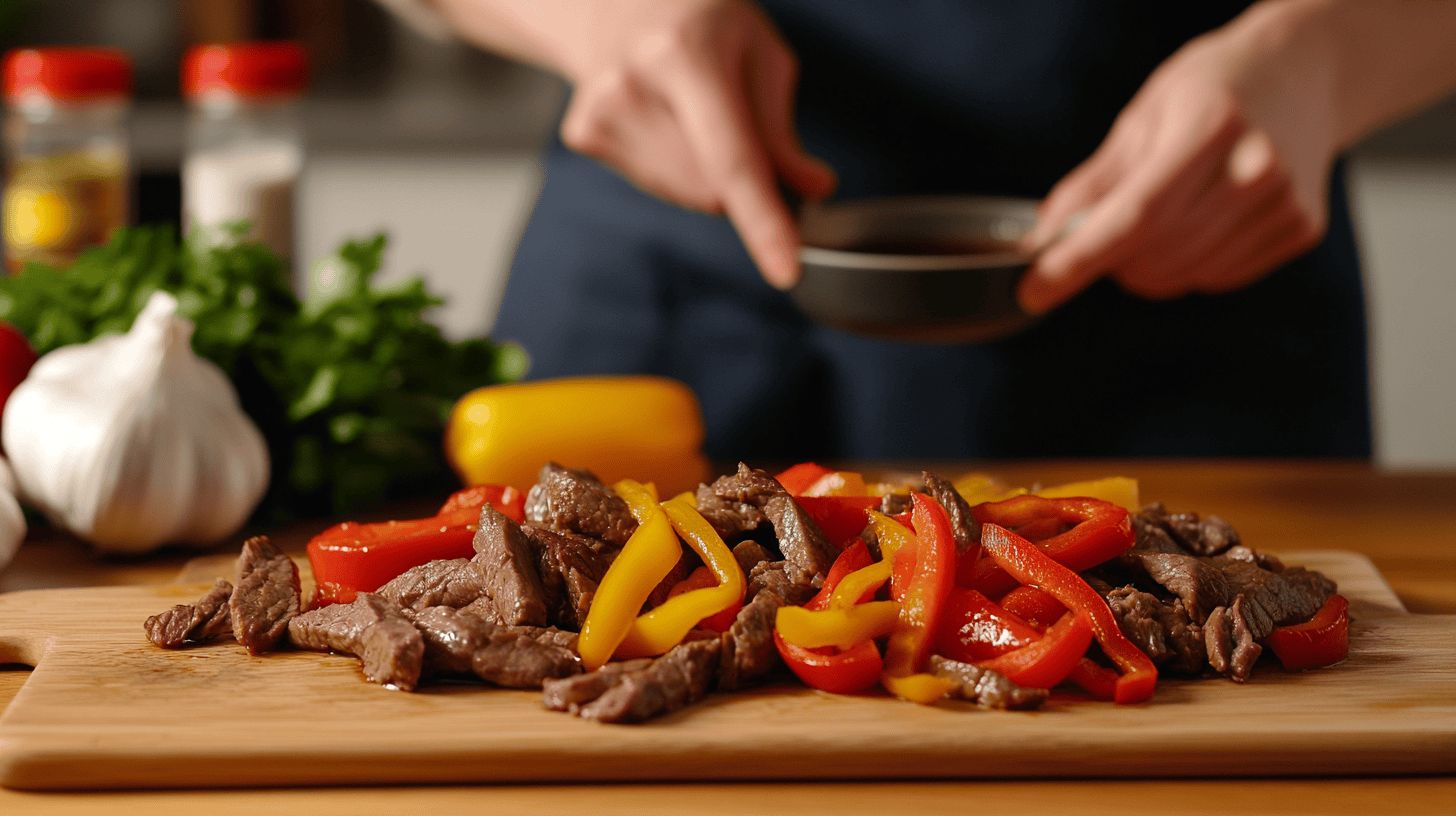Table of Contents
Introduction to Perfect Pepper Steak
Pepper steak is one of those dishes that feels like a restaurant delicacy but is totally doable at home. But here’s the thing: getting that perfect, tender, melt-in-your-mouth texture? It’s not always easy. You might have found yourself biting into chewy, rubbery steak and wondering, “What did I do wrong?” Well, don’t worry, because you’re not alone, and I’ve got you covered!
Pepper steak is meant to be tender, flavorful, and packed with juicy goodness. Let’s dive into the secrets behind making pepper steak that’s anything but chewy. Trust me, after this, your pepper steak game will be on point. 🥩✨
The Common Problem: Chewy Pepper Steak
One of the most frustrating things about cooking pepper steak is when it turns out tough and chewy. You probably worked hard, followed the recipe, and still, the steak isn’t what you hoped for. Why does this happen?
The answer lies in several small but crucial details: the cut of beef, how it’s cooked, and even how you slice it. Each of these factors plays a role in whether your steak will be tender or feel like a workout for your jaw.
“Cooking is an art, but perfecting steak? That’s a science. Master the details, and you’ll never dread pepper steak again.” 🔬
Why Texture Matters in Pepper Steak
Nobody wants to chew on rubbery steak, right? The texture of pepper steak can make or break the dish. A well-cooked, tender steak elevates your meal and pairs perfectly with the savory sauce and crunchy vegetables. On the flip side, a chewy steak ruins the whole vibe, no matter how good the sauce is.
If you’ve been there, it’s time to fix it. From the beef you choose to the way you treat it, small changes can have a huge impact. Let’s get into the nitty-gritty!
Understanding the Basics of Pepper Steak
What is Pepper Steak?
Pepper steak is a stir-fry dish that combines juicy strips of beef with bell peppers, onions, and a savory sauce. It’s a fan favorite because of its bold flavors and quick cooking time. Plus, it’s super customizable—you can adjust the seasoning, spice level, or even the veggies to your liking.
Key Ingredients for Pepper Steak
Here’s what you’ll typically need to whip up this dish:
| Ingredient | Quantity |
|---|---|
| Beef (sliced thinly) | 1 lb (450 g) |
| Bell peppers | 2 (sliced) |
| Onion | 1 (sliced) |
| Soy sauce | 1/4 cup |
| Garlic | 2 cloves |
| Cornstarch | 2 tbsp |
| Beef broth | 1/3 cup |
| Sugar (optional) | 1 tsp |
Nutrition Facts (Per Serving)
- Calories: 250
- Protein: 22g
- Carbs: 14g
- Fat: 10g
The Importance of Beef Cuts in Pepper Steak
Not all beef is created equal when it comes to pepper steak. The wrong cut can lead to chewy, unpleasant results. Picking the right cut is your first step to steak success.
Pro Tip: “Choose cuts that are naturally tender, like sirloin or flank steak. Avoid tougher cuts like chuck unless you plan to marinate or slow-cook them.” 🥩
Reasons Your Pepper Steak Might Be Chewy
So, why does it happen? Let’s break down the common mistakes that lead to chewy steak:
Using the Wrong Cut of Beef
If you’re using cuts like brisket or chuck without proper prep, you’re setting yourself up for disappointment. These cuts are great for stews, but for pepper steak? Not so much.
Overcooking the Steak
Overcooking is one of the biggest culprits. High heat and long cooking times can suck the juices right out of your meat, leaving it dry and tough.
Skipping the Tenderizing Process
Tenderizing isn’t optional if you want that melt-in-your-mouth texture. Whether it’s through marination or pounding, tenderizing preps your steak for greatness.
Not Resting the Meat After Cooking
Did you know resting is just as important as cooking? Slicing into your steak immediately after cooking causes all those precious juices to spill out, leaving you with dry meat. Patience is key!
Choosing the Right Cut of Beef for Pepper Steak
Best Cuts for Tender Pepper Steak
Here are your go-to options for tender pepper steak:
- Flank Steak: Lean, flavorful, and perfect when sliced against the grain.
- Sirloin Steak: A bit pricier but totally worth it for its tenderness.
- Flat Iron Steak: Inexpensive and tender when cooked correctly.
Cuts to Avoid
Steer clear of these cuts unless you’re ready to marinate or slow-cook them for hours:
- Chuck
- Round
- Brisket
Techniques to Make Pepper Steak Tender

Proper Marination: Recipes and Tips
Marination isn’t just for flavor—it’s a tenderizing powerhouse. Use a mix of soy sauce, garlic, ginger, and a splash of vinegar. The acid in the marinade helps break down tough muscle fibers, leaving your steak tender and juicy. Let it soak for at least 30 minutes, but if you have time, go for a few hours.
The Role of Acidic Ingredients in Tenderizing
Adding acidic components like lemon juice, vinegar, or yogurt can work wonders. They gently break down the meat’s fibers, making each bite softer.
Quote: “Think of acidic marinades as the magic potion for tough cuts. A little soak, and you’re good to go!” 🧪
Using Meat Tenderizers and Their Effectiveness
If you’re in a pinch, meat tenderizers can be a lifesaver. These powdered tools often contain enzymes that break down proteins quickly. Sprinkle lightly, and don’t overdo it—you don’t want mushy steak.
Cooking Tips for a Non-Chewy Pepper Steak

How to Cook Beef at the Right Temperature
Cooking steak is like a dance—you have to know the right moves to get it just right. One of the most critical steps? Controlling the heat. High heat is your friend when you want to sear the outside and lock in the juices, but keeping it too high for too long will dry out your meat.
- Pro Tip: Aim for medium-high heat when stir-frying pepper steak. Too low, and your meat stews instead of searing; too high, and it burns before it cooks through.
Use a meat thermometer if you’re unsure:
- Rare: 125°F (52°C)
- Medium Rare: 135°F (57°C)
- Medium: 145°F (63°C)
Stir-Fry Techniques for Even Cooking
When it comes to stir-frying, speed is the name of the game. The goal is to cook your steak evenly while keeping it tender. Here’s how:
- Preheat the Pan: A hot pan ensures a good sear. You should hear a sizzle the moment the steak hits the surface. No sizzle? Your pan’s not hot enough.
- Don’t Crowd the Pan: Overloading the pan drops the temperature, causing the steak to release juices and steam instead of sear. Cook in batches if necessary.
- Quick Cooking Time: Keep it short and sweet—2 to 3 minutes per side is usually enough.
The Importance of Preheating the Pan
Preheating isn’t just a fancy chef tip—it’s essential. A well-heated pan creates a caramelized crust on the steak, locking in the juices. Think of it as giving your steak a golden suit of armor. 🛡️
Timing and Cooking Duration Tips
Timing is everything in the kitchen, especially with pepper steak. Here’s a simple timeline to follow:
- Prep and Marinate: 30–120 minutes.
- Cooking Steak: 5–7 minutes (depending on thickness).
- Resting: 5 minutes.
Quote: “Patience in the kitchen pays off. A well-rested steak is a juicy steak!” 🍽️
Additional Tips for Enhancing Texture and Flavor
How to Slice Meat Against the Grain
Slicing against the grain is like cutting through a bundle of tiny ropes. When you cut across the fibers, you shorten them, making the meat easier to chew. Look for the direction of the muscle fibers (the lines running through the meat) and slice perpendicular to them.
The Role of Resting in Retaining Juiciness
Once your steak is cooked, resist the urge to dig in right away. Resting allows the juices to redistribute, making every bite tender and flavorful. Cover it loosely with foil and wait 5–10 minutes. It’s worth it!
Fun Fact: “Cutting into your steak too early is like opening a soda can you just shook—it’s going to lose all its good stuff!” 🥤
Adding Peppers and Onions for Complementary Texture
Bell peppers and onions aren’t just for flavor—they bring texture to the dish. Their crispness contrasts beautifully with the tender steak, making every bite interesting. Stir-fry them quickly to keep their crunch.
Solving Common Problems While Cooking Pepper Steak
What to Do if the Steak is Overcooked
Uh-oh, you overcooked the steak. Don’t panic—here are some quick fixes:
- Slice it Thinly: Thin slices are easier to chew, even if the meat is a bit tough.
- Add More Sauce: A flavorful sauce can mask dryness and add moisture.
- Re-purpose It: Use the steak in stir-fried rice, wraps, or even a salad where the toughness isn’t as noticeable.
Fixing a Bland or Over-Salted Dish
Sometimes you hit the seasoning jackpot; other times, not so much. Here’s how to adjust:
- Too Bland? Add soy sauce, a dash of salt, or a squeeze of lemon for brightness.
- Too Salty? Dilute with unsalted beef broth or add a touch of sugar to balance the flavors.
Salvaging Chewy Pepper Steak: Creative Solutions
If all else fails and the steak is still chewy, don’t toss it! Try these:
- Turn It Into a Stew: Slow-cook the steak with veggies and broth for a tender, hearty dish.
- Shred It: Chewy steak works well shredded in tacos or sandwiches.
- Cut Smaller Pieces: Smaller bites make the chewiness less noticeable.
FAQs About Pepper Steak
Why Is My Pepper Steak Chewy?
Chewy pepper steak is usually the result of one or more common mistakes:
- Wrong Cut of Beef: Tough cuts like chuck or round aren’t suitable for quick stir-frying.
- Overcooking: Cooking the steak too long or at the wrong temperature makes it dry and tough.
- Skipping Tenderizing: Failing to marinate or slice the meat against the grain can lead to a rubbery texture.
To fix this, always choose a tender cut, marinate properly, and cook the steak quickly over high heat.
How Do I Make My Steak Less Chewy?
Here’s how you can prevent chewiness and improve your steak’s texture:
- Marinate: Use acidic ingredients like soy sauce, vinegar, or lemon juice to break down the muscle fibers.
- Slice Against the Grain: Always cut the steak perpendicular to the muscle fibers for shorter, more tender bites.
- Cook Quickly: High heat for a short time ensures the meat stays juicy and tender.
- Rest the Steak: Letting the steak rest after cooking redistributes the juices, making it less dry and chewy.
Why Is Chinese Pepper Steak So Tender?
Chinese pepper steak is tender due to a combination of techniques:
- Velveting: This involves coating the beef in a mixture of cornstarch, egg white, and sometimes baking soda before cooking. This creates a protective barrier that locks in moisture and prevents overcooking.
- Thin Slices: The steak is sliced extremely thin against the grain, making it naturally easier to chew.
- Quick Stir-Frying: The steak is cooked over very high heat for just a few minutes, keeping it tender and juicy.
If you want to replicate that restaurant-style tenderness, velveting is the way to go. 🥡
Does Pepper Steak Get Softer the Longer You Cook It?
Not always. Pepper steak is a quick-cooking dish, so overcooking it actually makes it tougher. However, if you’re using a tougher cut of meat (like chuck or brisket) and cooking it in a stew or slow-cooking method, it can become softer over time.
For traditional pepper steak stir-fry, the key is short, high-heat cooking. The steak should cook just long enough to sear the outside while staying tender inside. If you overcook it, you’ll lose that delicate texture.
Tip: “For stir-fried dishes, always aim for speed and precision. Overcooking leads to disaster!” 🍳
Related Topics to Explore
When perfecting your pepper steak, there are other related insights and techniques that you might find helpful. Here are a few additional resources on pepper steak and similar dishes to enhance your cooking experience:
- Discover Why Chinese Pepper Steak Is So Tender to learn how velveting and stir-fry techniques can elevate your dish.
- Want to know the best beef for your dish? Check out What Cut of Meat Is a Pepper Steak? for the top picks for tender results.
- For a complete guide to preparing this dish, visit Pepper Steak Recipe: How to Make It Perfect Every Time for step-by-step instructions.
These articles will deepen your understanding and give you more confidence in the kitchen. Don’t miss out on these fantastic tips!
Conclusion: Perfecting Your Pepper Steak
Recap of Key Tips and Techniques
By now, you’re armed with everything you need to make pepper steak that’s tender, flavorful, and totally drool-worthy. Let’s quickly recap the secrets to success:
- Choose the Right Cut of Beef: Go for cuts like flank steak or sirloin for the best texture.
- Marinate Like a Pro: Use acidic ingredients to tenderize the meat.
- Cook Smart: Preheat your pan, cook quickly, and don’t overcrowd.
- Slice Against the Grain: Always cut perpendicular to the muscle fibers.
- Rest Your Steak: Let it sit for 5–10 minutes after cooking to lock in the juices.
Remember, pepper steak isn’t just about following a recipe—it’s about understanding the little details that make a big difference. And now you’ve got the know-how to nail it every time.
Encouragement to Experiment and Improve
Cooking is all about experimenting and making it your own. Don’t be afraid to tweak the recipe or try new marinades and techniques. Add a little spice if you like it hot 🌶️, or toss in extra veggies for a healthy twist. The possibilities are endless!
Quote: “Great chefs aren’t born—they’re made in kitchens filled with trial, error, and lots of pepper steak!” 👨🍳
Bonus: Quick Pepper Steak Recipe
Here’s a super simple recipe to put all your newfound knowledge to the test:
Ingredients
| Ingredient | Quantity |
|---|---|
| Flank steak | 1 lb (450 g) |
| Bell peppers | 2 (sliced) |
| Onion | 1 (sliced) |
| Soy sauce | 1/4 cup |
| Garlic | 2 cloves |
| Cornstarch | 2 tbsp |
| Beef broth | 1/3 cup |
| Sugar (optional) | 1 tsp |
| Oil (for cooking) | 2 tbsp |
Instructions
- Slice the steak against the grain into thin strips.
- Prepare the marinade by mixing soy sauce, garlic, and cornstarch. Marinate the steak for at least 30 minutes.
- Heat oil in a pan until it’s hot and shimmering. Add the steak in batches and sear quickly on both sides (2–3 minutes per batch). Set aside.
- In the same pan, stir-fry bell peppers and onions for 2–3 minutes.
- Combine beef broth, a bit more soy sauce, and sugar. Pour into the pan, then add the steak back in. Toss until everything is coated and heated through.
- Serve with steamed rice or noodles. Enjoy! 🍛
Final Thoughts
You’ve now got the ultimate guide to making pepper steak that’s tender, flavorful, and satisfying every time. Cooking doesn’t have to be complicated—just focus on the details, and let your passion shine through. Whether you’re cooking for yourself or impressing a crowd, this dish is sure to be a hit.
So go ahead, grab your apron, and make some unforgettable pepper steak. Your taste buds will thank you! 🥩✨

